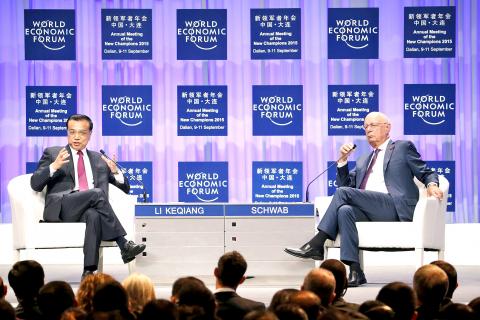China’s factory gate prices fell at their fastest rate in six years last month, the government said yesterday, as Chinese Premier Li Keqiang (李克強) warned that transforming the world’s second-largest economy is going to be a “painful and treacherous” process.
However, Li expressed confidence the country would hit its expansion target of around seven percent, as Beijing looks to soothe fears about a growth slowdown that have rocked global financial markets in recent weeks.
Moderate inflation can be a boon to consumption as it pushes buyers to act before prices go up, while falling prices encourage shoppers to delay purchases and companies to put off investment, both of which can hurt economic expansion.

Photo: Reuters
However, prices for China’s factory-produced goods have fallen as growth has slowed and overseas demand slackened, while the key property market has also weakened, hitting demand for construction materials. Plants — many of them state-owned — are also loath to drastically cut employees, leading to continued production even when demand is weak.
China’s producer price index (PPI) declined 5.9 percent last month, the Chinese National Bureau of Statistics (NBS) said.
The result was the worst since a 7.0 percent fall in September 2009 and marked the 42nd consecutive monthly drop.
PPI is a leading indicator for consumer inflation, which rose to 2.0 percent last month, the NBS said, its highest in 12 months.
The consumer price index (CPI) rise was higher than July’s 1.6 percent and the strongest since last August, driven by rising pork costs.
The growth slowdown and declines in commodity prices have helped keep China’s consumer inflation in check, with some economists even voicing concerns about possible deflation.
“Looking ahead, we expect both measures of inflation to rebound over the coming quarters,” Capital Economics China economist Julian Evans-Pritchard said in a note, referring to CPI and PPI.
Steep falls in pig numbers would keep food prices high, while the decline in global commodity prices late last year mean both inflation measures should strengthen soon on weaker bases for comparison, “which ought to help assuage any lingering concerns over deflation,” he said.
China is looking to move its economy from the investment and export-led model of the past to one driven by consumer demand, and Li told a World Economic Forum meeting in the northeastern city of Dalian that it “is going to be a painful and treacherous process.”
However, he insisted China did not threaten the world economy and was itself buffeted by global trends.
“China is not a source of risk for the world economy but a source of strength for global growth,” Li said, stressing that it accounted for about 30 percent of world economic expansion in the first half of this year.
“China is an economy that is closely integrated with the international market,” he said.
“Given the weak growth of the global economy, China cannot stay unaffected and the deep-seated problems that have built up over the years are also being exposed,” he said.
Li said that policymakers would not be moved by short-term movements in the economy, while standing ready to take action as necessary.
“If there are signs the economy is sliding out of the proper range we have adequate capability to deal with the situation,” he said.
“The Chinese economy will not head for a hard landing,” Li said.

In Italy’s storied gold-making hubs, jewelers are reworking their designs to trim gold content as they race to blunt the effect of record prices and appeal to shoppers watching their budgets. Gold prices hit a record high on Thursday, surging near US$5,600 an ounce, more than double a year ago as geopolitical concerns and jitters over trade pushed investors toward the safe-haven asset. The rally is putting undue pressure on small artisans as they face mounting demands from customers, including international brands, to produce cheaper items, from signature pieces to wedding rings, according to interviews with four independent jewelers in Italy’s main

Japanese Prime Minister Sanae Takaichi has talked up the benefits of a weaker yen in a campaign speech, adopting a tone at odds with her finance ministry, which has refused to rule out any options to counter excessive foreign exchange volatility. Takaichi later softened her stance, saying she did not have a preference for the yen’s direction. “People say the weak yen is bad right now, but for export industries, it’s a major opportunity,” Takaichi said on Saturday at a rally for Liberal Democratic Party candidate Daishiro Yamagiwa in Kanagawa Prefecture ahead of a snap election on Sunday. “Whether it’s selling food or

CONCERNS: Tech companies investing in AI businesses that purchase their products have raised questions among investors that they are artificially propping up demand Nvidia Corp chief executive officer Jensen Huang (黃仁勳) on Saturday said that the company would be participating in OpenAI’s latest funding round, describing it as potentially “the largest investment we’ve ever made.” “We will invest a great deal of money,” Huang told reporters while visiting Taipei. “I believe in OpenAI. The work that they do is incredible. They’re one of the most consequential companies of our time.” Huang did not say exactly how much Nvidia might contribute, but described the investment as “huge.” “Let Sam announce how much he’s going to raise — it’s for him to decide,” Huang said, referring to OpenAI

The global server market is expected to grow 12.8 percent annually this year, with artificial intelligence (AI) servers projected to account for 16.5 percent, driven by continued investment in AI infrastructure by major cloud service providers (CSPs), market researcher TrendForce Corp (集邦科技) said yesterday. Global AI server shipments this year are expected to increase 28 percent year-on-year to more than 2.7 million units, driven by sustained demand from CSPs and government sovereign cloud projects, TrendForce analyst Frank Kung (龔明德) told the Taipei Times. Demand for GPU-based AI servers, including Nvidia Corp’s GB and Vera Rubin rack systems, is expected to remain high,